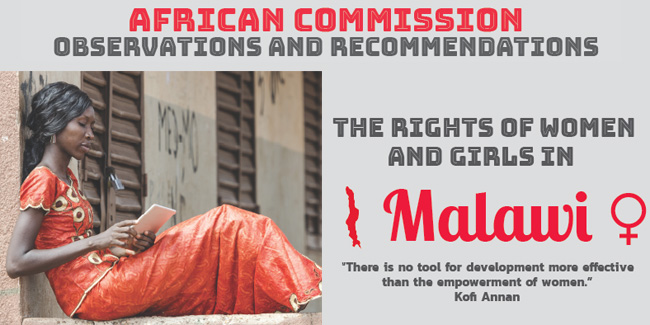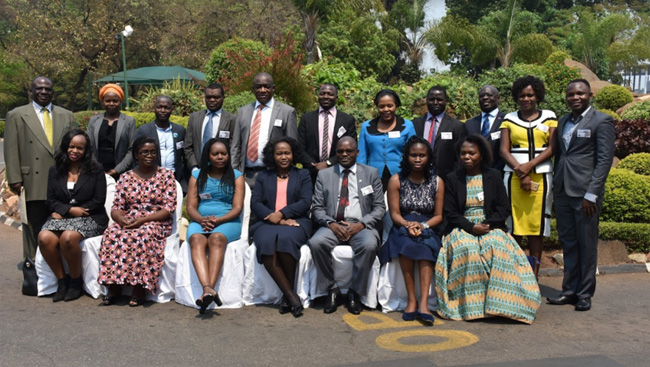On Wednesday 18 October 2017, the Women's Rights Unit of the Centre for Human Rights (the Centre) organised a one-day meeting with Government and civil society organizations on Malawi’s compliance with the concluding observations issued by the African Commission on Human and Peoples’ Rights (African Commission) specifically in relation to the Protocol to the African Charter on Human and Peoples Rights on the Rights of Women in Africa (Maputo Protocol). The meeting was held in collaboration with the Ministry of Justice and Constitutional Affairs in Malawi. The meeting brought together a total of about 20 stakeholders from the relevant government ministries, National Human Rights Commission, Office of the Ombudsman and Civil Society Organisations involved in the state reporting process in the country. The meeting was held at the Sunbird Capital hotel, in the capital city of Lilongwe.
 Download Factsheet
Download Factsheet
To provide a background, the Government of Malawi presented its initial and combined report (1995- 2013) to the African Commission in April 2015 in compliance with reporting obligations under Article 62 of the African Charter and Article 26(1) of the Maputo Protocol. After consideration of the report, the African Commission issued concluding observations and recommendations which the Government of Malawi is expected to act on. In view of strengthening the mandate of the Special Rapporteur on the Rights of Women in Africa (Special Rapporteur) therefore, the main objective of the meeting was to discuss Malawi’s compliance with these concluding observations and recommendations specifically in relation to the Maputo Protocol that were issued by the African Commission. Other objectives of the meeting were; to constructively engage with the stakeholders to share Malawi’s national strategies including processes and procedures as well as challenges in implementing of concluding observations and recommendations.
The meeting began with an opening address by the Secretary of Justice and Solicitor General of Malawi, Dr Janet Banda. In her address, she emphasized that the Government of Malawi had taken concrete steps in efforts to implement the concluding recommendations since it was issued by the African Commission. These included, amendment to raise the minimum (marriageable) age for children from 16 years to 18 years old in the Malawian Constitution. She also underlined other efforts aimed at ending child marriage in the country through various advocacy actions. These include a national wide media campaign on ending child marriage and a national anti trafficking plan of action.
Ms. Patience Mungwari Mpani from the Centre, provided an introductory presentation offering a background to the African Commission’s concluding observations and recommendations issued to Malawi and specifically in relation to the Maputo Protocol. Mr Pacharo Kayira, Chief Advocate and Director for Human Rights in the Ministry of Justice and Constitutional Affairs then gave a detailed presentation on the procedures and practices that Malawi follows in responding to, and implementing of treaty body concluding observations. The presentation was particularly informative, highlighting comprehensively efforts that had been taken since the African Commission’s concluding observations were issued. These efforts included a dissemination plan of the soft copies and hard copies of the concluding recommendations to the relevant ministries involved in the country.
Other strategies included the establishment of a National Task Force in the country to ensure implementation of the concluding recommendations. Emphasis was made on the fact that this national task force meets three or four times a year to examine the status of the implementation of these concluding recommendations. It was recognised that although the establishment of the National Task Force was highly commendable, there was need for the taskforce to be representative of the entire country by ensuring adequate district level representation. The presentation stressed how recommendations made by treaty bodies including the African Commission had been incorporated in the country’s National Human Rights Action Plan using the recommendations given by the Universal Periodic Review as benchmark. Malawi is also at an advanced stage in the drafting of the next report due to the African Commission, in which they also detail how they have responded to these concluding observations.
From the focus group discussion facilitated by Mr Chairman Okoloise from the Centre and Mr William Msiska from the Law Reform Commission of Malawi, it was interesting to note the considerable agreement among stakeholders on how these outlined strategies have so far ensured significant achievements in Malawi in response to the concluding recommendations issued by the African Commission. One of the highlights of the meeting was seeing participants critically engage the broader and specific issues dealing with the measures taken by Malawi at the various spheres and levels of governance and society to implement the concluding observations and recommendations of the African Commission through the focus group discussions. The general observation was that there seemed to be a good working relationship between the civil society and government stakeholders especially with regards to the implementation of the African Commission’s concluding observations in Malawi. While this relationship is highly commendable, it is hoped that civil society can engage constructively with the government in their two pronged functions of monitoring and implementation in the country.
Furthermore, the meeting was an opportunity and platform to share the summarized factsheet on African Commission’s concluding observations specifically in relation to the Maputo Protocol to the Malawi government that was compiled and drafted by the Centre. It is hoped that these factsheets will assist in creating the necessary grassroots and local awareness of the African Commission’s concluding observations in relation to the Maputo Protocol as well as the government’s obligations to guarantee its implementation.
A major outcome from the meeting was the expressed commitments that Government and civil society stakeholders offered to continue the implementation process of the African Commission’s concluding recommendations in the country in order to ensure that women in Malawi begin to enjoy their rights. The expressed willingness to ensure the continued implementation process in the country was also linked to sustainability in ensuring that the government continues to fulfil its reporting obligations under the African Commission. A final outcome was an expressed willingness by the stakeholders to ensure that they provide the needed input and information to guide the research work that the Centre is conducting to offer honest assessments on Malawi’s compliance with the concluding observations.



